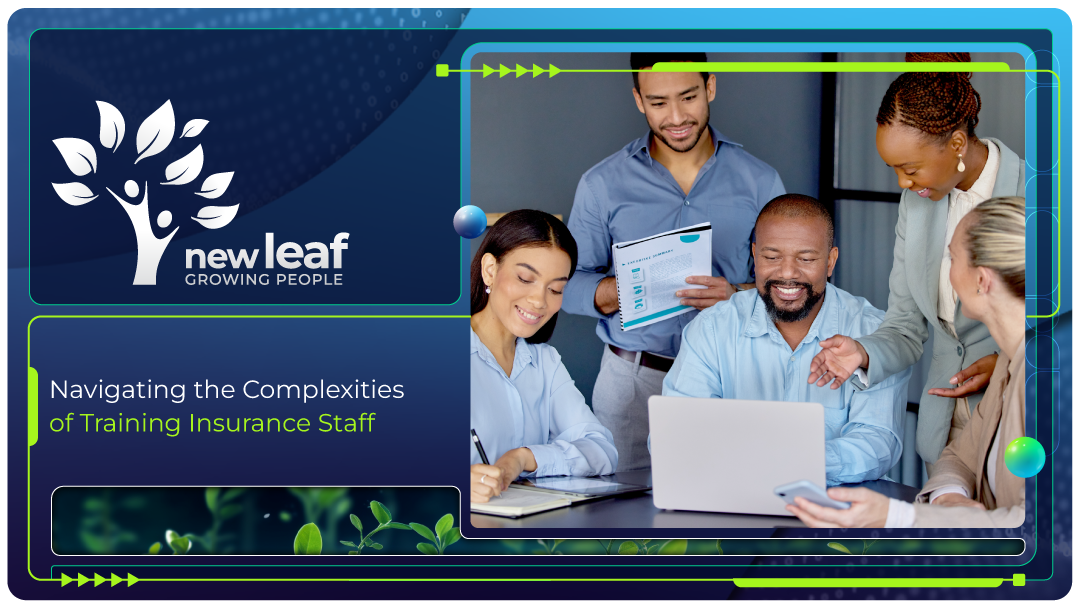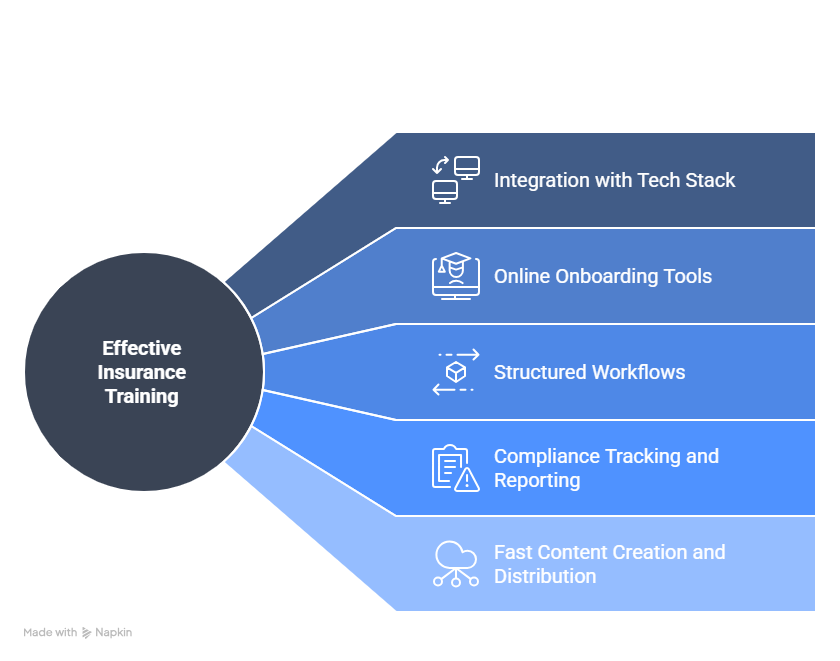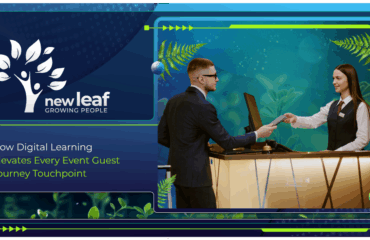
The insurance industry is inherently complex, with evolving product lines, strict regulations, and high client expectations. Its core mission is to mitigate risks—but without adequately training employees, insurers and their clients are exposed to costly errors and legal liabilities. The rise of digital learning in insurance can help reduce errors and manage these risks.
Training and upskilling employees in this complex industry comes with a fair set of challenges. Michael Hanly, Managing Director of New Leaf Technologies, says: “There are risks of non-compliance, uninformed frontline or call centre staff on product changes, and heavy administrative training workloads that are prone to error. Employee retention and attrition can also be big factors, while dry content leads to low completion rates. In many cases, it’s hard to directly tie training efforts to business impact.”
Training challenges are compounded by:
- Rapid changes in consumer expectations and market conditions,
- Accommodating language and time zone differences, and
- Reaching outsourced, remote, and hybrid teams, some of whom may have limited tech access or knowledge of digital transformation in insurance.
Insurance companies are turning to flexible Learning Management Systems (LMSs) and Learning Experience Platforms (LXPs) that offer scalable insurance training solutions to overcome these challenges. These systems can create a continuous, personalised learning environment and provide online training for insurance professionals through compliance-driven learning paths tailored to specific roles. Best of all, agents can access training on their own time, from wherever they are, using their preferred devices.
Key Challenges in Insurance Training—And How an LMS Solves Them
Insurance agents, brokers, underwriters, adjusters, and other industry professionals have to be versed in the most recent products, rules, policies, and best practices. They must also continuously develop new skills to fulfil their clients’ evolving demands and expectations. Let’s look at the main challenges and how digital learning in insurance using an LMS can solve them.
Staying Compliant with Industry Regulations
Challenge: Continuous regulatory and product changes require ongoing education and certification for frontline and call centre staff. They also require specialised training across multiple jurisdictions and product lines. Risks are also constantly evolving, demanding new skills and frameworks to reduce the chance of non-compliance, penalties, legal action, and reputational harm.
Solution: Up-to-date insurance compliance training libraries plugged into your LMS ensure your employees have on-demand access to the latest regulations and product information. Automated tracking and reporting of training progress, completion, and performance gives managers peace of mind that employees are on track.
Retaining and engaging insurance employees in training
Challenge: Employee retention in the insurance industry is notoriously difficult due to high-pressure sales environments, complex products, constantly evolving regulations, and limited opportunities for career growth.
Solution: Ongoing career path training and upskilling play a crucial role in tackling this issue. Engage employees in interactive learning experiences, such as gamification, simulations, quizzes, videos, podcasts, and social learning to give life to dry content and make training fun. You can also create tailored learning paths, feedback, recognition, and rewards based on their jobs, objectives, preferences, and performance.
Adapting to Rapid Market & Consumer Changes
Challenge: Customers expect fast, personal, and digital-first experiences – mirroring what they get from tech-savvy industries like retail and banking. Insurance companies face economic volatility, climate-related risks, and emerging technologies (like AI and telematics) that require them to adapt quickly, rethink risk models, and innovate their products. Staying competitive doesn’t just require smarter tech, it also calls for an agile, customer-first mindset across the entire organisation.
Solution: With personalised learning paths, microlearning modules, and scenario-based learning, an insurance LMS can help employees build the agility and knowledge they need to:
- Handle evolving risks,
- Deliver seamless customer experiences, and
- Comply with industry standards.
Consumer expectations have shifted from transaction-based to relationship-based approaches, requiring training in new soft skills. This is another area where digital learning in insurance can help.
Delivery & Measurement Obstacles
Challenge: Balancing day-to-day operational demands with the time needed for learning and development is a major hurdle. Additionally, measuring the training program’s return on investment (ROI) can be difficult, making it harder to justify ongoing investment. Delivering personalised, role-specific training at scale is another challenge, especially in large organisations with diverse job functions. With many teams now working remotely or in hybrid models, adapting training strategies to engage distributed employees adds yet another layer of complexity.
Solution: eLearning’s flexibility ensures that both in-house and remote teams can access training anytime, anywhere. Role-specific, on-demand, mobile-friendly, and scalable learning that fits around busy schedules allows employees to complete training at their own pace without disrupting daily operations. With built-in analytics and reporting tools, it becomes easier to measure the ROI of training by tracking engagement, completion rates, and performance improvements, and measuring these against L&D (Learning & Development) and business goals.
How is video-based learning transforming managerial training in the insurance industry?
Let’s face it—insurance training can be dry. But video learning brings it to life. Forrester’s research on using videos for workplace training shows employees are 75% more likely to watch a video than read documents, emails, or web articles. And, according to the Research Institute of America, video-based learning can reduce training time by up to 60% compared to traditional instructor-led training.
Here are some examples to inspire you:
- Scenario-based videos make dry topics more engaging by putting managers in real-life decision-making roles.
- Microlearning with video nuggets delivers high-impact eLearning content.
- AI tools (e.g. Synthesia) allow you to create high-quality, AI-driven video content featuring realistic avatars that can deliver training in multiple languages.
- Interactive video quizzes and knowledge checks transform passive learning into immersive, active learning experiences.
- Video-based assessments test not just knowledge but also decision-making and critical thinking skills.
Best Practices for Using An LMS For Insurance Training
For L&D to truly support business outcomes in this sector, learning systems should be fully integrated into your organisation’s wider operational tech stack—such as Active Directory, HRM, ERP, and other informational systems. Other important features include online insurance onboarding tools to enable seamless learner orientation, and structured workflows to ensure tailored content delivery, personalised learning journeys, and robust compliance tracking and reporting.
Insurance training platforms like aNewSpring are built with these complexities in mind. In a fast-moving industry like insurance, where regulatory changes and product updates are frequent, tools like Articulate 360 also play a key role. According to Michael, they enable L&D teams to create and distribute contextual content up to 9 times faster, ensuring learners always have access to relevant, up-to-date information.

New Leaf Technologies Are Experts At Insurance Employee Training
Whether you’re training underwriters, onboarding agents, or upskilling managers, contact New Leaf Technologies for an innovative insurance industry eLearning solution powered by a global insurance training platform. Along with technical support, you’ll get full access to our industry-leading eLearning experts, software developers, and instructional design professionals. This ensures you get the right training system to overcome the challenges unique to the insurance industry.




